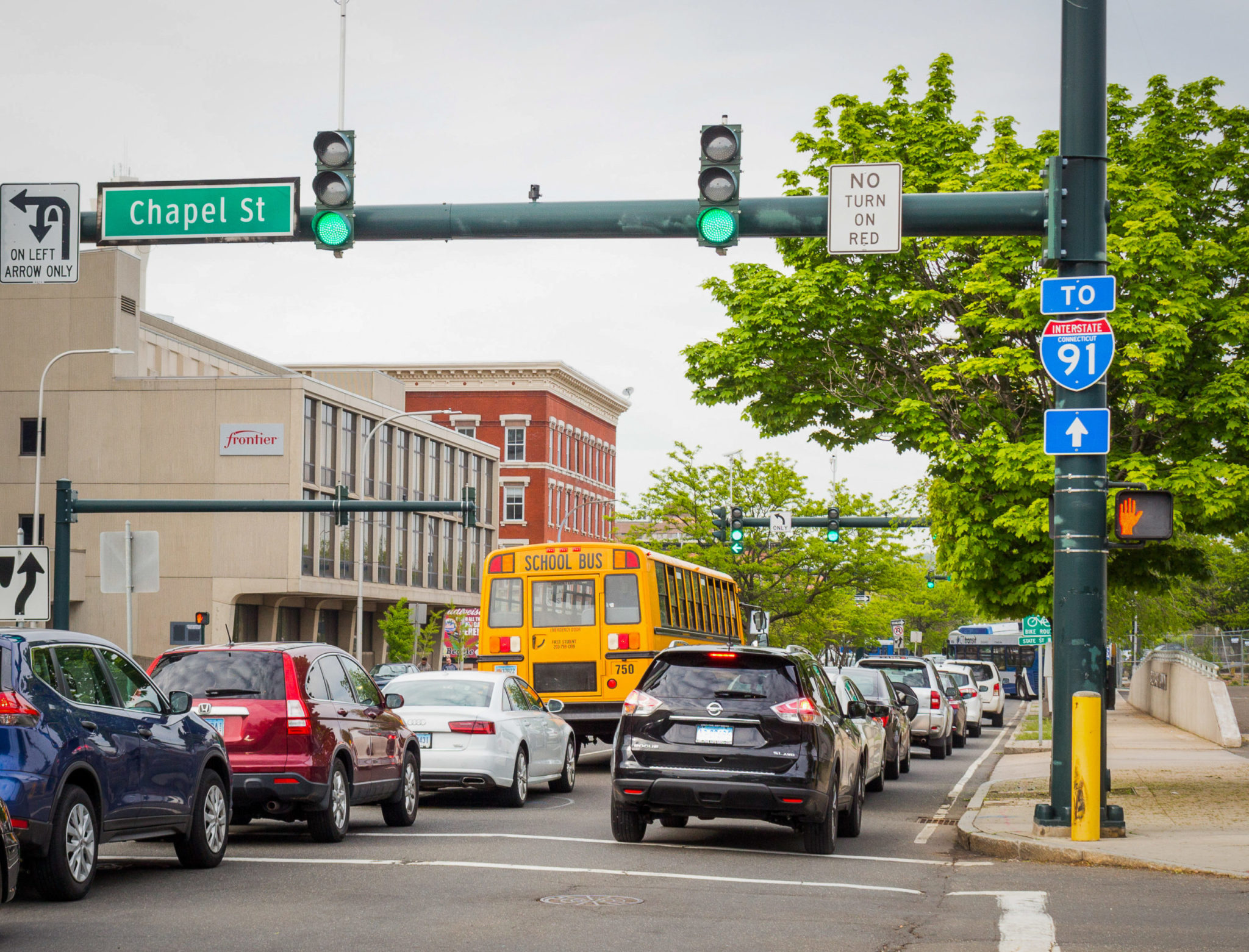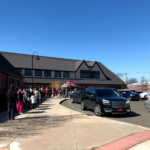
Daniel Zhao, Senior Photographer
On Thursday evening, New Haven Public Schools Superintendent Iline Tracey and other district officials virtually spoke to and answered questions from more than 300 New Haven Public School community members about the state of the school district.
Now more than a year since schools first closed due to the pandemic, Tracey spoke to NHPS families at the event about the present conditions and future plans of the school district. The superintendent praised the district for achieving its goal of providing an internet-connected device and access to the internet to every district student. Then, Tracey’s assistant superintendents and others spoke about actions that the district has taken to support English language learners, students with disabilities, chronically absent students, distressed families and other vulnerable populations.
“We go along with the changes and we adjust and do the best thing we can by our families because … if it hadn’t been for families, there would be no need for a central office or schools or teachers or anyone,” Tracey said to the families at the event. “You are important to us, so we want to be sure that we are taking care of your needs.”
Questions and discussion at the forum revolved around the district’s ongoing phased reopening plan and newly released data that indicates an unprecedented number of students failing at least five classes.
Reopening plan progresses
Beginning on Jan. 19, Pre-K through 5th-grade students were able to go back to students in a hybrid model. Middle school students were afforded the same opportunity starting March 5.
The district plans to open high schools at a limited capacity on April 5. The announcement had attracted concern from community members who have suggested the district is moving too quickly. Some have argued that the district does not have adequate resources to guarantee the safety of students, in part because the district is short on school nurses.
Early last month, the city revealed that NHPS schools have “approximately eight” vacant school nurse positions, Health Director Maritza Bond told the New Haven Register. Bond said that school nurse shortages were the cause of both increased demand for nurses and nurses leaving NHPS for other school districts. Since then, the city government, which is in charge of the district’s school nurse program, has sought to hire additional school nurses. On Thursday evening, Tracey said that NHPS high schools will have enough nurses — at least one per school — to safely reopen.
Tracey told those in attendance that the district never considered opening without “adequate nursing services in place.”
Tracey added that Americans with Disabilities Act accommodations presented an additional barrier to the district’s high school reopening, as teachers with ADA accommodations are allowed to teach remotely even if schools are operating on a hybrid basis. She said that high schools have a higher concentration of teachers with ADA accommodations than middle and elementary schools. Approximately 200 teachers in NHPS qualify for these accommodations, Tracey previously told the News.
According to Tracey, the district has been actively hiring substitute teachers for classes with teachers who choose to lecture from home per the ADA, where classrooms would otherwise not have an in-person teacher. The substitute teachers would serve as an in-person counterpart and work in conjunction with the remote teacher.
In addition to returning to school for in-person instruction, high school seniors might be able to have an in-person graduation option, according to Assistant Superintendent Paul Whyte ’93.
“Right now, we are planning for some version of in-person graduation based on the current guidelines,” Whyte said. “We are looking at what the locations and options will be available because of space limitations.”
Tracey added the district has informed high school principals to come up with a “plan A” and “plan B” for high school graduation that takes into account the ever-changing nature of the pandemic.
More in-person school, less social distancing?
Two other major developments are occurring in the district’s phased reopening.
One applies to elementary school students: Tracey announced that on March 29, fourth and fifth graders will be allowed to return to school for four days a week instead of the current two days a week. The district’s current reopening plan divides students fourth grade and up into two cohorts, one of which attends in-person classes on Monday and Tuesday, while the other, on Thursday and Friday. By the end of the month, all students opting into in-person classes will be able to attend on all four days.
For all students, a change in social-distancing guidelines remains a possibility. Tracey said that the district is actively monitoring a potential change in CDC guidelines that would lower in-school social distancing recommendations from six feet to three feet.
Tracey noted that the current six-foot social-distancing guideline, which the district currently follows, limits the number of students that can be in a classroom at any one given time. If guidelines change, then classroom occupancy limits and the phased reopening plan details may also change.
Tracey said that if the CDC implements the new guidelines, the district will explore the possibility of allowing middle school students to also return to school for in-person learning four days a week, instead of the current two.
‘Why are students receiving Fs during the pandemic?’
At a Wednesday Board of Education subcommittee meeting, NHPS Student Data Chief Michele Sherban presented a bleak picture of learning loss for Elm City students.
Data the district has compiled comparing students’ performances from fall 2020 to fall 2019 revealed that 657 high school students failed five or more classes this past fall — more than four times as many as the 160 high school students who did the same in fall 2019. Data showed similar spikes in the number of middle school students failing classes. African American and male students were disproportionately represented among the struggling students, according to NHPS data as reported in New Haven Independent.
The surge has invoked community concern. At Thursday’s forum, one community member asked, “Why are students receiving Fs during the pandemic?”
District officials responded by offering insight into the reasons they believe absenteeism and learning loss rates remain high.
Tracey noted that student absenteeism has been unusually high during the COVID-19 pandemic. She added that the district is actively looking at its data to determine the root causes as to why students are not succeeding in schools.
Chief of Youth, Family and Community Gemma Joseph-Lumpkin said that young elementary school students as well as 9th and 10th graders are of particular concern for the district because their absenteeism rates are particularly high.
Assistant Superintendent Keisha Redd-Hannans pleaded for the community to treat students with more academic leniency and outlined some of the measures the district has taken to address poor grades.
“Students are transforming their learning styles … we need to give grace to our students, we need to understand that this is new for our students,” Redd-Hannans said. “They are not going to accomplish some of the same things they were able to accomplish in person.”
Tracey said that the federal ESSER II grant, a $37.8 million gift from the federal government, places emphasis on accelerating student learning. NHPS has already launched parent focus groups to discuss four specific priority areas in which funds can be spent — one of these areas pertains to academic support and learning loss.
Tracey stated that the district is aiming to host a “robust” summer school to further accelerate student learning. The superintendent later stated that the district is still finalizing its summer school plans, but that they depend in part on the number of school staff that are willing to teach over the summer.
Tracey referenced the “Attend, Connect and Engage” campaign, which has canvassed district doors to identify and address the needs of chronically absent students and families.
Joseph-Lumpkin pointed out that the district has worked with Yale and will work with other community partners to roll out tutoring programs. Previously, the district launched a homework helpline with Yale’s Dwight Hall to tutor students at Title I schools. Joseph-Lumpkin said that next week, the district and Southern Connecticut State University will begin a tutoring and mentoring program exclusively for ninth-grade students.
On March 31 at 5 p.m., the district will host a virtual information session exclusively for parents of students with disabilities.
Christian Robles | christian.robles@yale.edu











